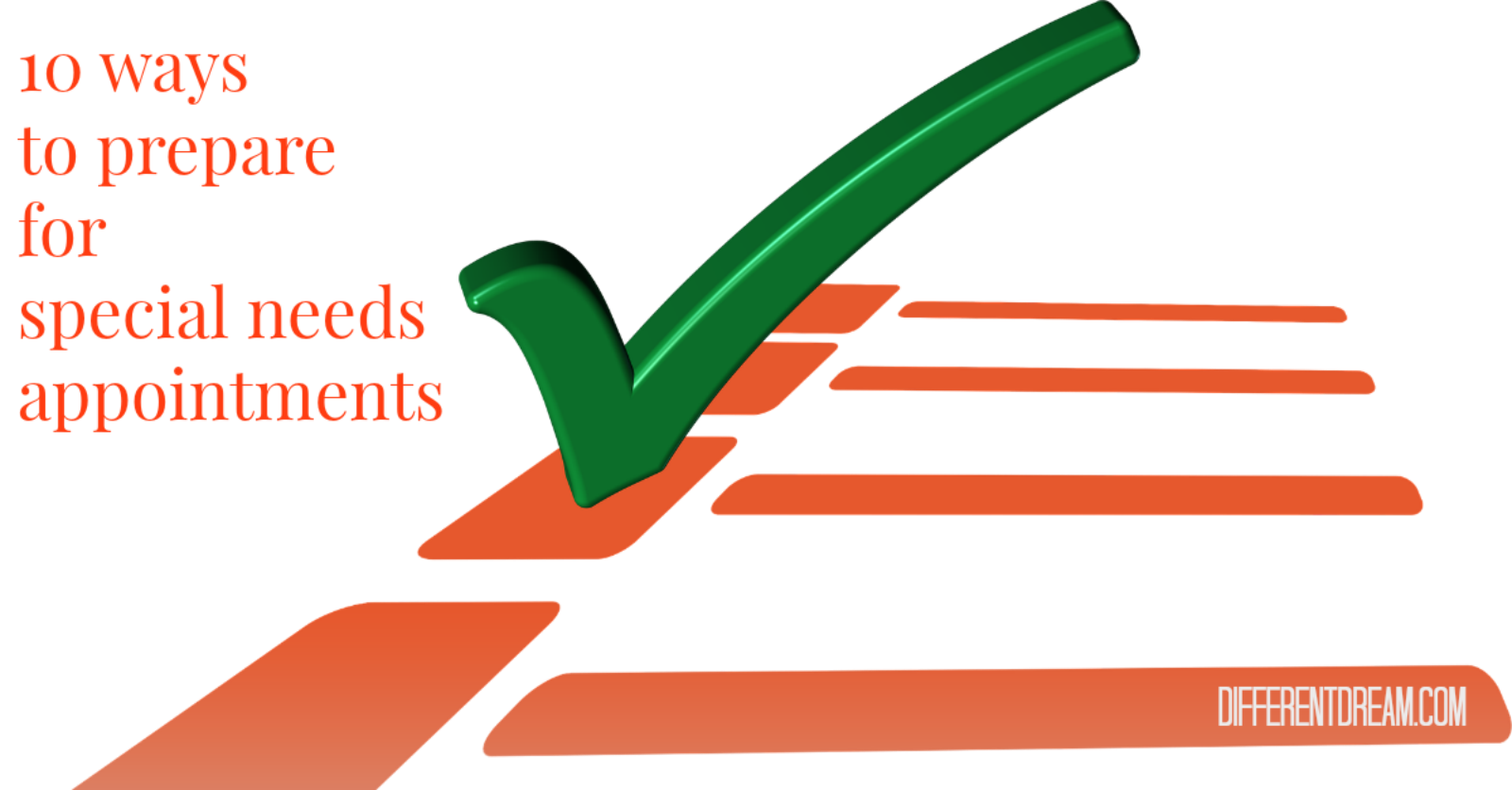Special Needs Appointments: A Check List Can Help

I remember the shock of taking Allen to his first regular doctor’s appointment after he was released from NICU. The shock wasn’t from anything the doctor said or did. The shock came from realizing how much harder it was to go somewhere with a baby. You know what I mean. And if you’re the parent of a child with special needs, you know it can be hard to get him or her to appointments as a toddler, preschooler, child, adolescent, and an adult.
Today, guest blogger Rachel Cordeiro shares a check list she created to prepare for special needs appointments with her daughter, Cami. So get ready for some advice, born of experience, that will make your life easier.
Tips to Prepare for Upcoming Special Needs Appointments
Sometimes I find that in the journey of parenting a special-needs child, even simple tasks seem impossible. Scheduling appointments becomes overwhelming, and all the steps involved appear insurmountable.
Overwhelmed by Appointments
How will I find childcare for all of my children? What if the only available time for a crucial appointment doesn’t fit into my husband’s work schedule? What about my work schedule? I need to fax what to whom? What if the specialist doesn’t accept my insurance?
Feeling overwhelmed may lead to avoidance, something you cannot afford to allow to happen when it comes to scheduling critical appointments.
A Check List Can Help
Something I have found helpful is making a simple check list. Seeing it on paper helps me to realize it is manageable and I can accomplish everything one item at a time.
Here is an example of a basic checklist:
- Just call. Self-explanatory but true! The first step is to simply make the phone call to the doctor you think your child needs to be seen by or one that has been recommended. Because many specialists have a weeks to months-long waiting list it’s crucial you make the call sooner than later. If applicable, this is also the time to ask what insurances they may (or may not) accept.
- Write it down. After you have the appointment time set, add it to your calendar. I usually input the information in my Google calendar and set up a reminder, but I also write it down (calendar on fridge, personal planner, etc.).
- Make a note. Write down what you need (insurance card, referral, former tests/records, evaluations, etc.) and add as a note to your calendar. Another tip? Take care of the referral as soon as appointment is scheduled to avoid forgetting. Depending upon your insurance, failure to receive a necessary referral may lead to a higher medical bill, and many doctors will not even see you without a referral even after months of waiting.
- Schedule time off. My husband likes to come to appointments if his schedule allows, which is often just a matter of planning ahead. Give yourself plenty of time to put in your notice for a day off and follow your employer’s procedure regarding such.
- Schedule childcare. My two children without special needs are not yet in school, which means they need childcare. I try to ask far enough in advance to ensure I can find someone to watch them for the day of appointment. This alleviates any unnecessary stress closer to the day of appointment.
- Keep a folder. Keep a folder of any paperwork pertaining to the appointment (referrals, faxes, emails, appointment confirmation letter, map to office, etc.).
- Notify teachers. It is up to your own personal discretion how much information you share regarding the appointment itself, but it is common courtesy to let the teachers know ahead of time that your child will be out for that day—a simple note or email a week or two ahead of time should be fine.
- Double-check. One week before the appointment is a good time to review that everything is in place (confirmation of childcare, referral, etc.) while still giving ample time to take care of any last-minute unfinished tasks.
- Write down questions. A day or two before the appointment, take the time to write down a list of what you plan to address at the visit, and then add it to your folder.
- Relax. You did it! This can be the trickiest part of all, as feelings of anxiousness seem to go hand in hand with appointments to the doctor, but rest assured knowing that you’ve done your best to prepare.
What’s On Your Check List for Special Needs Appointments?
Boy, do I wish Rachel’s checklist had been around in 1982. I could have used it many times. So, how do you prepare for appointments with your special needs child? What’s on your checklist? Leave a comment to add your expertise to Rachel’s.
Do you like what you see at DifferentDream.com? You can receive more great content by subscribing to the quarterly Different Dream newsletter and signing up for the daily RSS feed delivered to your email inbox. You can sign up for the first in the pop up box and the second at the bottom of this page.
Subscribe for Updates from Jolene
Related Posts
My Favorite Vacation Planning Tips for Special Needs Families
Are you traveling this summer? Jolene provides her favorite vacation planning tips for special needs families.
The Weight of Silence as Parents of Kids with Invisible Disabilities
Guest blogger Lisa Pelissier explains the weight of silence as parents of kids with invisible disabilities.
How to Build a Thriving Marriage as You Care for Children with Special Needs
Todd and Kristin Evans explain how to build a thriving marriage as you care for children with special needs.






0 Comments